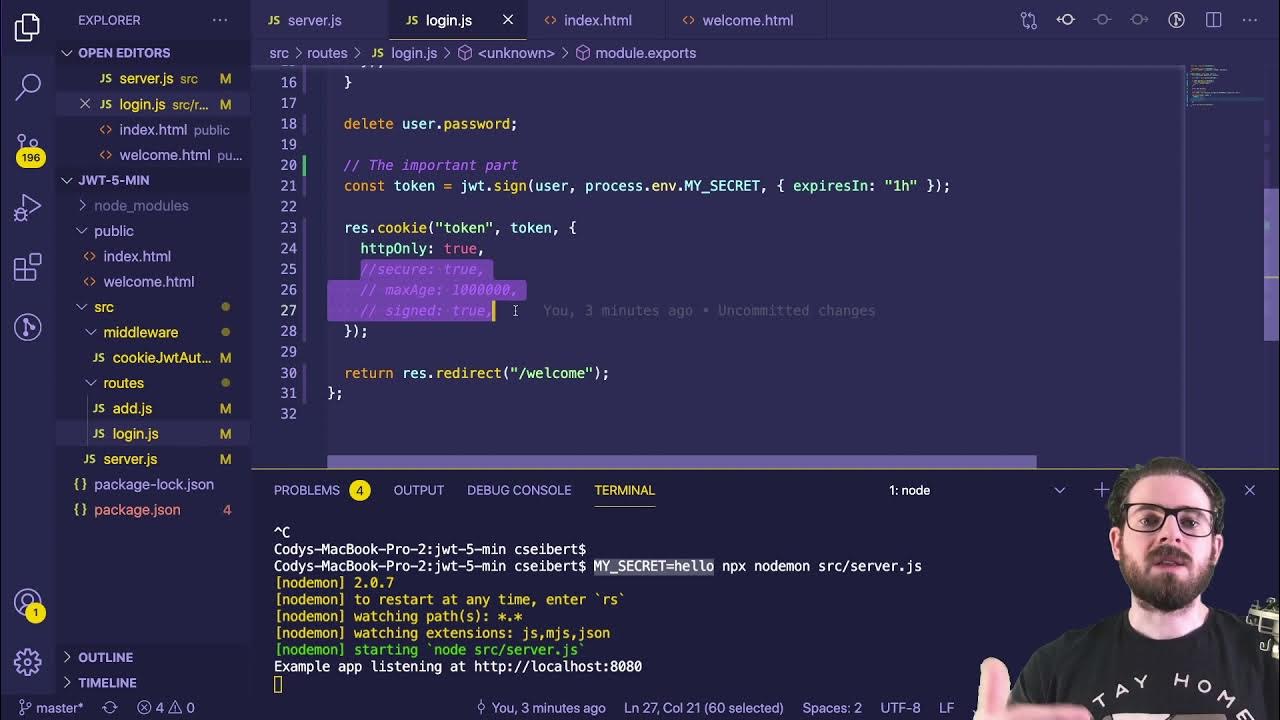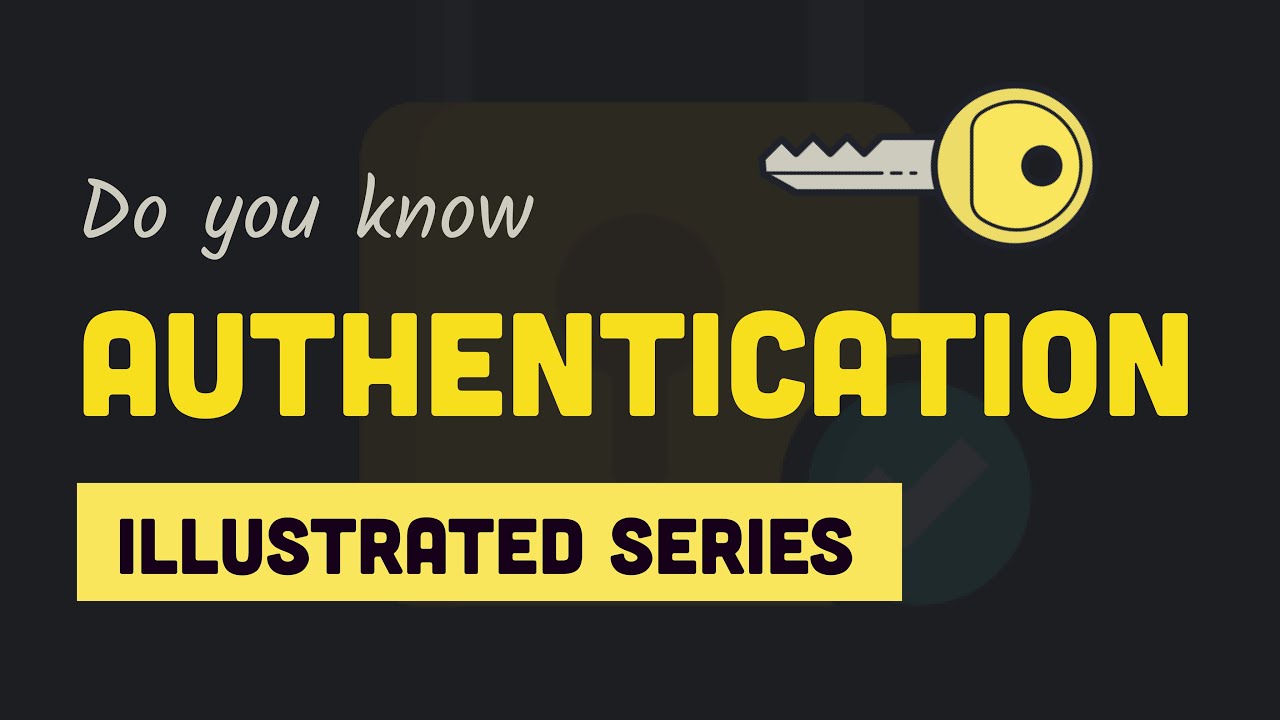Difference between cookies, session and tokens
Summary
TLDRThis video explains the concepts of cookies, sessions, and tokens in online authentication. Using the example of logging into a bank account, it describes how cookies store session IDs that identify users without repeatedly requiring their credentials. The video contrasts traditional cookie-based authentication with token-based methods, which provide more secure and flexible access to resources, especially for third-party applications. It highlights the importance of security, the roles of various parties in token interactions, and the protocols involved, such as OAuth and JWT. The video aims to clarify these concepts and their practical implementations.
Takeaways
- 😀 Cookies and sessions are essential for user authentication on websites, allowing secure login processes.
- 😀 A session ID is generated by the server upon successful login and is stored in a cookie on the user's device.
- 😀 Cookies act as a transport medium for session IDs, which the server uses to identify user sessions without needing to re-enter credentials.
- 😀 If a user logs out or remains inactive for a certain period, the session will expire, and the cookie will become invalid.
- 😀 Different websites implement varying session lifetimes; for example, banks often use shorter session durations for security.
- 😀 Cookies can be compared to gym membership cards, allowing access based on valid credentials, but only for specific services.
- 😀 Security concerns arise from client-stored cookies, prompting servers to validate session IDs against their databases.
- 😀 Tokens, unlike session IDs, can be used for granting third-party apps limited access to user data without exposing passwords.
- 😀 JSON Web Tokens (JWTs) are a type of token that contain signed information about user permissions and session validity.
- 😀 The interaction with tokens often involves multiple parties, ensuring interoperability and reduced risk compared to traditional sessions.
Q & A
What are cookies in the context of web authentication?
-Cookies are small pieces of data stored on the user's computer that are used to manage sessions and maintain user state across requests in web applications.
How does a session ID function during the login process?
-After a user logs in successfully, the server generates a session ID and sends it to the user's browser as a cookie. This session ID uniquely identifies the user's session without requiring them to re-enter their credentials for subsequent requests.
What happens if a session expires due to inactivity?
-If a session expires due to inactivity, the user will be required to log in again. The server will also instruct the browser to delete the cookie containing the session ID.
What is the primary security concern with cookies?
-Cookies can be manipulated since they are stored on the client-side, making it necessary for servers to validate the information stored in them to prevent unauthorized access.
How do tokens differ from traditional sessions?
-Tokens often involve multiple parties and can provide limited access to data without sharing user credentials. They are cryptographically signed to ensure integrity, whereas traditional sessions store all information on the server and grant full access.
What is the role of HTTP in cookie and session management?
-HTTP is the protocol used for communication between the client (browser) and server. Cookies are sent through HTTP headers, allowing the server to manage sessions effectively.
How do tokens enhance security compared to cookies?
-Tokens enhance security by allowing users to authenticate with a service without sharing their username and password. They can grant limited access and are often used with standards like OAuth to ensure safe interactions between multiple parties.
Why might a bank use a short-lived session compared to a service like Facebook?
-A bank may use short-lived sessions (e.g., 5 minutes) as a security measure to protect sensitive financial information, while services like Facebook may allow longer sessions for user convenience.
What is OAuth, and how does it relate to token-based authentication?
-OAuth is an authorization framework that allows third-party applications to gain limited access to user data without sharing credentials. It uses tokens to facilitate this secure interaction.
What are some potential use cases for token-based authentication?
-Token-based authentication is commonly used in mobile applications, third-party integrations, and scenarios where user credentials need to remain confidential, such as accessing financial data or personal information.
Outlines

This section is available to paid users only. Please upgrade to access this part.
Upgrade NowMindmap

This section is available to paid users only. Please upgrade to access this part.
Upgrade NowKeywords

This section is available to paid users only. Please upgrade to access this part.
Upgrade NowHighlights

This section is available to paid users only. Please upgrade to access this part.
Upgrade NowTranscripts

This section is available to paid users only. Please upgrade to access this part.
Upgrade NowBrowse More Related Video

Learn JWT in 10 Minutes with Express, Node, and Cookie Parser

Secure Angular APP with JWT & Spring Boot | Ultimate Authentication Guide

Session vs Token Authentication in 100 Seconds

Authentication Fundamentals | Authentication Series

Next.js App Router Authentication (Sessions, Cookies, JWTs)

How Authentication Works
5.0 / 5 (0 votes)